Chicory: A Medicinal & Culinary Perennial (And How To Make Roasted Chicory Root)
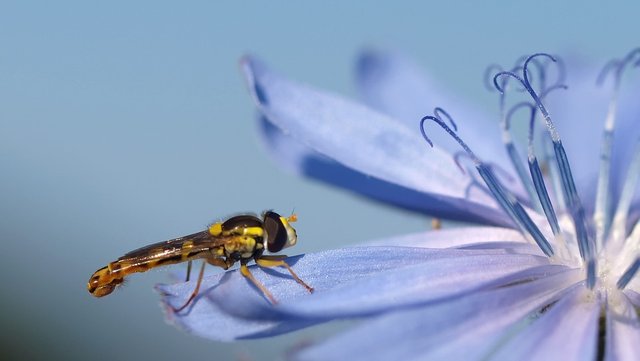
Chicory (Cichorium intybus) is a fascinating nutritional and medicinal plant.
Part of the aster family if is native to the northern Middle East to southern Balkan Peninsula. It has naturalized to North America, Europe and Australia. It is a plant with many names including wild endive, cheveux de Paysans,Succory, just to name a few.
This is a versatile plant, providing an important bitter element to your diet. You can use all parts of the plant from roots, shoots, leaves and flowers.
This is a fast growing perennial and there are both wild and cultivated varieties. I honestly found this a bit confusing when I wanted to buy seeds. You are best to seek a local forager, pick up a foraging guide and check with local seed houses to determine which varieties you can access.
You can harvest the wild plants or you can grow your own from seed. All varieties can be used from leaf to root. We find it very difficult to dig up the roots in the wild so we chose to cultivate our own. We are growing 'Italiko Red chicory' in a raised bed box this year. We'll try and gather seeds of the wild growing chicory as well. This drought tolerant, easy to please perennial has just become one of our tough growing season rock stars.
.... A Little Chicory History
Historically, chicory was grown by the ancient Egyptians as a medicinal plant, coffee substitute, and vegetable crop and was occasionally used for animal forage.source
The War-time Coffee Substitute
Post world war II coffee was still being rationed and by then people had devised all sorts of ways to enjoy a hot coffee like drink. I love how resourceful people can become when they need to.

I was over in England when my Great Aunt Margaret offered us a drink of coffee, which turned out to be a bottle of 'Camp Coffee' a dark syrup containing caffeine, sugar and chicory essence. This was a product that first came out in around 1876 (according to wikipedia). My mother in a moment of nostalgia exclaimed that this her mum had loved chicory 'coffee' and drank it daily which piqued my interest and journey into cultivating this plant.
Nutritional Value/benefits
Chicory root is high in vitamin C, antioxidants and is a rich source of beta-carotene and inulin. The tuber supports digestion by increasing bile production. It's all about that bitter element that many people are missing from their diets. Bitter is incredibly important for supporting and strengthening our digestive functions. Chicory can assist with a wide range of digestive issues.
Chicory is said to have anti-inflammatory and antibacterial, anti parasitic properties. The root can be used to aide with symptoms digestive disorders such as feeling full, flatulence and slow digestion. It can increase appetites for those suffering with a loss of appetite. It also provides glucose control, the root contains up to 40% inulin, which is a zero on the glycemic index, offering a negligible effect on raising blood sugar.
Chicory holds a bitter taste. In ayurvedic teachings, “bitter” is beneficial for reducing water retention, reducing weight, cooling skin rashes, fever, burning, and nausea.source
Ancient Romans used Chicory root as a ‘cleansing’ medicinal herb, they prescribed it to cleanse the blood.source
How to use the whole plant
The Root/Tuber
The root/tuber is most commonly used dried, granulated, and roasted as a coffee substitute, or additive to coffee grounds. As a vegetable, it can be boiled and eaten. It can be steeped in hot water for a tea or used as an ingredient for fermenting/brewing of beers.
The Buds
The buds and young leaves can be used in salads or cooked like spinach and other greens. To reduce the bitterness quickly blanch the leaves in boiling water and then cook them as you would like from there. Sautéed with garlic and butter is always nice and they are also nice in soups and stews.
The Blossom
The blossoms have been reportedly used as a wash or poultice made from steeping the blossoms and leaves was used to treat wounds. Research has shown that the blossoms have some antimalarial properties.
Look at these perfectly cultivated roots! Ours were skinny in comparison.
The Leaves
The leaves can be chopped up and tossed into soups and stews (our favourite), They can be sprinkled in salad to add a bitter element (quite nice in moderation). If you find them too bitter you can boil them in water for a few minutes, strain and then cook, this will lessen the bitter taste. We dehydrated some leaves so that we can use them in soups and stews for the winter.
Modern Medicinal Applications
When applied topically as a poultice, the raw and crushed leaves of chicory can help treat and prevent fungal growth on the skin.
When brewed into a hot tea or herbal infusion, chicory infusions can help prevent liver damage and fight sinus infections.
When consumed raw, chicory can aid digestive functions.
The leaves and root of chicory can be tinctured in alcohol to extract the antioxidant properties of the plant.
Here are some old world uses as found at botanical.com. source
A decoction of 1 OZ. of the root to a pint of boiling water, taken freely, has been found effective in jaundice, liver enlargements, gout and rheumatic complaints, and a decoction of the plant, fresh gathered, has been recommended for gravel.
Syrup of Succory is an excellent laxative for children, as it acts without irritation.
An infusion of the herb is useful for skin eruptions connected with gout.
The old herbalists considered that the leaves when bruised made a good poultice for swellings, inflammations and inflamed eyes, and that 'when boiled in broth for those that have hot, weak and feeble stomachs doe strengthen the same.' Tusser (1573) considered it - together with Endive - a useful remedy for ague, and Parkinson pronounced Succory to be a 'fine, cleansing, jovial plant.'
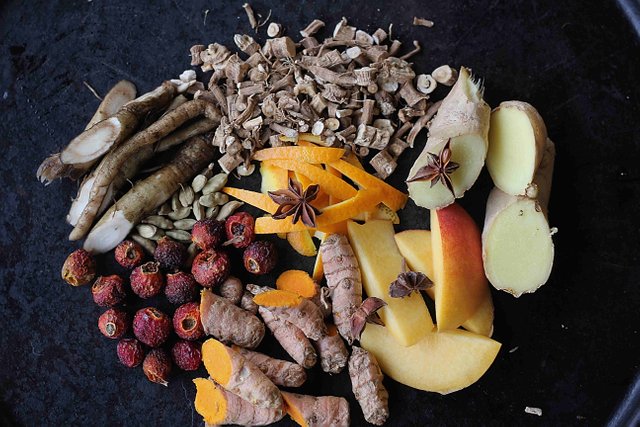 Roasted chicory root top centre @walkerland
Roasted chicory root top centre @walkerland
How To Make Roasted Chicory Root
This roasted chicory can be used for a wide range of purposes from medicinal aromatic bitters, tinctures, tea, coffee, beer and most famous as an additive to coffee. Chicory enhanced Coffee is darker, richer and more complex in flavour. You just need to add a heaping spoon of ground chicory to your coffee grounds and brew away.
- Dig up your chicory root. In our experience this requires a lot of patience as it likes to grow in hard packed, rocky soil. - - Dig around the root to expose as much of it as you can and they pry it up with a good tool.
- Wash and scrub all dirt off the roots.
- Allow to dry for several days or 5-6 hours in a dehydrator.
- Chop up the root into small pieces and spread on a cast iron pan (or whatever oven tray or pan you have)
- Roast on the lowest setting of your oven, nice and slow. We roasted at 200-ish degrees F for about 6 hours. The roots should visibly be turning darker brown as you roast them. Be sure to turn the roots and shake the pan occasional while roasting. Be careful not to burn them.
- Store in an airtight container. You can grind them up using a coffee grinder or mortal and pestle into a coffee ground like consistency or leave them as they are and grind up as needed.
Further reading on Chicory
https://www.restorationseeds.com/products/italiko-red-chicory
https://www.herbazest.com/herbs/chicory
https://www.myseedneeds.com/products/chicory-italian-dandelion
https://www.botanical.com/botanical/mgmh/c/chicor61.html
https://www.drweil.com/diet-nutrition/food-safety/is-chicory-good-for-you/
Building a greener, more beautiful world one seed at a time.
Homesteading | Gardening | Frugal Living | Preserving Food| From Scratch
Cooking|
You can also find me at: walkerland.ca |
Facebook
Photo copyright: @walkerland unless otherwise noted.
Main image copyright pixabay.


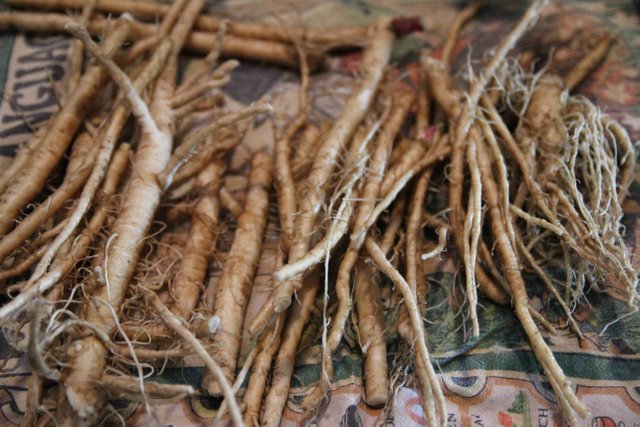
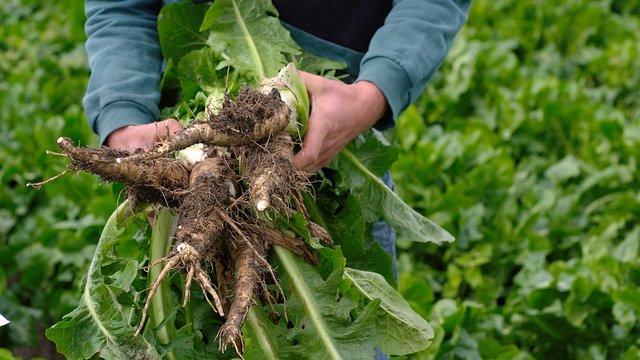
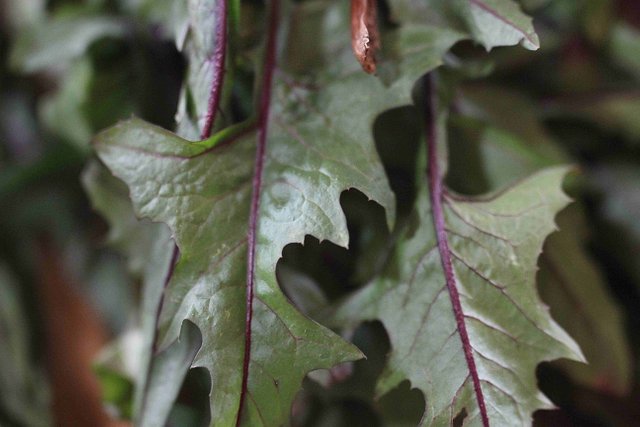
A guy on youtube sent me and many others free seeds of chicory. They sprout so easily. I love seeing the flowers growing on the road sides. They love dry clay soil and hot sun.
oh wow! That is so wonderful. How nice to be given free seeds. Beautiful photos - thank you! :)
I've never seen them with the white like that! How cool!
I didn't know it was such a versatile plant. I had digestion issues for many years. Doctors couldn't help me as they didn't find anything in my blood. At the end I went to the nutritionist who told me that the way I eat is great BUT I am missing the bitter ingredients. Well, I really dislike the taste. But I agreed to buy artichoke drops and it helped. I feel much much much better.
Now when I hear about chicory I think that I will try to replace my drops with coffee with chicory root. It sounds so interesting and it is much more natural than drops from pharmacy.
And I love that you can use the whole plant! I wonder how many people know about that..
Thank you for sharing the recipe. I will try to purchase the root and see what I can do :) Congratulations on the curie vote! I'm very happy that this post has such an attention as it is very useful!
Thank you so much for sharing your story @delishtreats! Bitter is really important for our wellness and the North American diet is very lacking in this area. I've just written a post on making digestive bitters that I'll be posting today.
A few years ago before I started growing my own I was able to order roasted chicory root on-line in a reasonable sized bag. I am sure you'll have no trouble finding some pre-roasted. We didn't grow nearly enough this year so I might even have to order more later in the winter.
Thanks so much for the encouragement, I really appreciate it!
I grew chicory this year, and it did wonderfully. Huge plants covered in flowers. Just hope it survives the winter. I've planted it in the past and it didn't survive.
Love your post, and your beautiful photos!
oh I hope it survives here too! I've got extra seeds and would love to have a huge patch of it growing. I really enjoy it.
Images are as clean as the life changing information you shared. Plants provide medicine and it’s important more people know this so that they can engage in the conservation of plants. Let your food be thy medicine and it always feels great reading about medicinal food.
It really is exciting to learn how to work with these plants for our health and nutritional needs. Thanks so much @thegreens, I agree with you completely.
Hi walkerland,
Visit curiesteem.com or join the Curie Discord community to learn more.
Thank you very much for this! I really appreciate the support and encouragement!
Okay, I'm sold. You described my front garden where I struggle to grow anything! Do the cultivated varieties have bigger roots, do you know? If you don't dig up the roots, does it spread via them like comfrey does?
My grandmother used to love her chicory coffee. My mum used to have it too, because she reacted to coffee, it made her itch. Unfortunately, she still prefered her coffee.
I don't actually know for certain, I would imagine it depends on where they are grown. Our dandelions for example get huge roots in the field that we've been carefully amending to make lighter but the ones growing everywhere else have tiny roots. I have to think it is all about the soil.
I have read that it spreads by seed but I was hoping that the roots will spread as well (it has a similar looking root system to horseradish). I am not positive of this.
https://www.uaex.edu/publications/PDF/FSA-6081.pdf
Thank you for the link.
What a fascinating read @walkerland! And such lovely photos. I must admit I don't like the taste of chicory but then I think store bought loses that fresh and powerful flavour of roasting yourself. Now to try to find chicory in South Africa!
The roasted scent was intoxicating - I really like it. It is bitter though! I took a good nibble at the raw root and it certainly fired up all those bitter receptors in my tongue! We cooked the leaves in a stew and it was delicious but raw they were too bitter for my taste. I wonder if you can grow it in SA? I hope you find some!
Not all the photos were mine this go around (I make notes under each one) I failed to take chicory flower photos for some reason. Pixabay had some lovely ones though. I love the first one.
That's interesting. I enjoy a bitter tang but not too wildly bitter! I noticed they weren't all yours but still good choices. I'll have to ask around about chicory plants. What conditions do they prefer?
According to the interweb: Chicory prefers fertile, well-drained soils rich in organic matter for best growth. IT can be grown from seeds or transplants. It grows wild in all kinds of hard packed soil. We grew ours in a raised bed with quite good soil.
Thanks @walkerland but I didn't explain correctly. I mean weather conditions? Despite having freezing winters it's not cold enough for apples here. And our summer's are the hottest in the country but we can't grow mango.
ah, sorry. It is always quite the adventure figuring out what will or wont grow. I've read that it grows in Australia and South Africa so it seems to be really adaptable to climate considering that it grows well here in Canada as well.
Will try to find it then, thanks @walkerland
That was a little discovery for me, never heard it before and it was really interesting to know that you can stretch coffee with chicory. As many well known but forgotten herbs and plants it seems to be real healthy to be antioxidant and rich in Vit C no wonder it is helpful in inflammatory processes as to us, western people we just get used to go to out-of counter and get Ibuprofen which is widely used against inflammation.
That is also very useful information that you explained how to use, leaves, roots and buds. I will try to see if there anything available in our herbal shops :)
This was such a great read. I have never heard if the chicory plant, it seem like a really interesting plant, packed with so many amazing benefits, now, everyone needs to know about this.
It was really resourceful of them to have used it as a coffee substitute, how does it tastes though, is it just like coffee or even better?
I don't like bitter tastes though, I am not sure if I am gonna enjoy taking it. Maybe using it topically (when needed) will be better for me, for a start. Well, until I get the courage to take in that bitter taste. I really don't know why "bitter" is really essential for us, I mean, what's inside of it? I will try checking for it around here, maybe I will spot it.
You recommended blanching it in hit water so as to reduce it's bitterness, isn't it gonna get rid of some of its benefits?
Bitter is a very interesting taste. A lot of people don't like it until they learn to use it in ways that taste good!
It will still have a lot of benefits when blanching the leaves. Chopping up a handful of leaves and cooking them in a soup is really nice, and tastes really good.
I mix the roasted chicory root with coffee and really enjoy it that way. It makes the coffee richer and darker and I really like it. That would be a good way to try it for the first time.
That's really great to know, I always try to stay away from anything bitter, it seems like I should start giving it a bit of attention 😃
Mixing it with coffee sounds like a great way to "sneak" it in, I hope I enjoy it just as you do... It all about finding what works for me, I will just explore the "bitter" world a little, chicory looks like a great place to start...
It's amazing that not even a part of this plant is wasted!
it really is an interesting plant.
When we first got into diversifying the types of food we grow and gather I found the slightly bitter taste of some of the wilder lettuces and greens a bit overpowering. A bit at a time and I've now come to really enjoy them. :)
One step at a time, I will get used to it. Hopefully!
Woo! Love your post - we've given you a full upvote with a chance to be featured in the weekly curation. Hope this helps you continue to write such amazing posts. We've also resteemed it. We encourage you to use the #naturalmedicine tag so we all can connect and find each other.
If you're a supporter of all things natural healing, and haven't already got on board our collective, you might like to read our introductory post here. We'd also love to welcome you on Discord here!!
We are also running a competition for Steem prizes this fortnight, and would love you to enter! You can find the post guidelines here !